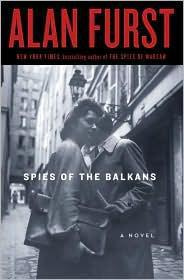Alan Furst - Mission to Paris
Here you can read online Alan Furst - Mission to Paris full text of the book (entire story) in english for free. Download pdf and epub, get meaning, cover and reviews about this ebook. genre: Detective and thriller. Description of the work, (preface) as well as reviews are available. Best literature library LitArk.com created for fans of good reading and offers a wide selection of genres:
Romance novel
Science fiction
Adventure
Detective
Science
History
Home and family
Prose
Art
Politics
Computer
Non-fiction
Religion
Business
Children
Humor
Choose a favorite category and find really read worthwhile books. Enjoy immersion in the world of imagination, feel the emotions of the characters or learn something new for yourself, make an fascinating discovery.

- Book:Mission to Paris
- Author:
- Genre:
- Rating:3 / 5
- Favourites:Add to favourites
- Your mark:
- 60
- 1
- 2
- 3
- 4
- 5
Mission to Paris: summary, description and annotation
We offer to read an annotation, description, summary or preface (depends on what the author of the book "Mission to Paris" wrote himself). If you haven't found the necessary information about the book — write in the comments, we will try to find it.
Mission to Paris — read online for free the complete book (whole text) full work
Below is the text of the book, divided by pages. System saving the place of the last page read, allows you to conveniently read the book "Mission to Paris" online for free, without having to search again every time where you left off. Put a bookmark, and you can go to the page where you finished reading at any time.
Font size:
Interval:
Bookmark:
Alan Furst
Mission to Paris
GERMAN MONEY
In Paris, the evenings of September are sometimes warm, excessively gentle, and, in the magic particular to that city, irresistibly seductive. The autumn of the year 1938 began in just such weather and on the terraces of the best cafes, in the famous restaurants, at the dinner parties one wished to attend, the conversation was, of necessity, lively and smart: fashion, cinema, love affairs, politics, and, yes, the possibility of war that too had its moment. Almost anything, really, except money. Or, rather, German money. A curious silence, for hundreds of millions of francs tens of millions of dollars had been paid to some of the most distinguished citizens of France since Hitlers ascent to power in 1933. But maybe not so curious, because those who had taken the money were aware of a certain shadow in these transactions and, in that shadow, the people who require darkness for the kind of work they do.
The distinguished citizens, had they been willing to talk about it, would have admitted that the Germans, the political operatives who offered the bounty, were surprisingly adept. They knew how to soften a conscience, presented bribery as little more than a form of sophisticated commerce, of the sort that evolves in salons and offices and the private rooms of banks a gentlemans treason. And the operatives could depend on one hard-edged principle: that those who style themselves as men of the world know there is an iron fist in every velvet glove, understand what might await them in the shadows and so, having decided to play the game, they will obey its rules.
Still, human nature being what it is, there will forever be somebody, wont there, who will not.
One such, on the fourteenth of September, was a rising political star called Prideaux. Had he been in Paris that evening, he would have been having drinks at Fouquet with a Spanish marquis, a diplomat, after which he could have chosen between two good dinner parties: one in the quarter clustered around the Palais Bourbon, the other in a lovely old mansion up in Passy. It was destiny, Prideaux believed, that he spend his evenings in such exalted places. And, he thought, if fucking destiny had a shred of mercy left in its cold heart he would just now be hailing a taxi. Fucking destiny, however, had other things in mind for the future and didnt care a bit what became of Prideaux.
Who felt, in his heart, terribly wronged. This shouldnt be happening to him, not to him, the famously clever Louis Prideaux, chef de cabinet technically chief of staff but far more powerful than that to an important senator in Paris. Well, it had happened. As tout Paris left for the August migration to the countryside, Prideaux had been forced to admit that his elegant world was doomed to collapse (expensive mistress, borrowed money, vengeful wife) and so hed fled, desperate for a new life, finding himself on the night of the fourteenth in Varna, the Black Sea port of Bulgaria. Bulgaria! Prideaux fell back on his lumpy bed at a waterfront hotel, crushed by loss: the row of beautiful suits in his armoire, the apartment windows that looked out at the Seine, the slim, white hands of his aristocratic by birth, not behaviour mistress. All gone, all gone. For a moment he actually contemplated weeping but then his fingers, dangling over the side of the bed, touched the supple leather of his valise. For Prideaux, the life preserver in a stormy sea: a million francs. A soothing, restorative, million, francs.
This money, German money, had been meant for the senator, so that he might influence the recommendation of a defence committee, which had for some time been considering a large outlay for construction on the northern extension of the Maginot Line. Up into Belgium, the Ardennes forest, where the Germans had attacked in 1914. A decision of such magnitude, he would tell the committee, should not be made precipitously, it needed more time, it should be studied, pros and cons worked through by technicians who understood the whole complicated business. Later, the committee would decide. Was it not wise to delay a little? Thats what the people of France demanded of them: not rash expenditure, wisdom.
All that August, Prideaux had temporized: what to do? The suitcase of money for the senator had reached Prideaux by way of a prominent hostess, a German baroness named von Reschke, whod settled in Paris a few years earlier and, using wealth and connection, had become the ruling despot of one of the loftiest salons in the city. The baroness spent the summer at her chateau near Versailles and there, in the drawing room, had handed Prideaux an envelope. Inside, a claim ticket for the baggage office at the Gare de Lyon railway station. This is for you-know-who, shed said, ever the coquette, flirting with the handsome Prideaux. Hed collected the suitcase and hidden it under a couch, where it gave off a magnetic energy he could feel its presence. Its potential.
The senator was in Cap Ferrat, wouldnt return until the third of September, and Prideaux sweated through hot August nights of temptation. Sometimes he thought he might resist, but the forces of catastrophe were waiting and they wouldnt wait long: his wifes ferocious lawyer, the shady individuals whod loaned him money when the banks no longer would, and his cruel mistress, whose passion was kindled by expensive wines with expensive dinners and expensive jewellery to wear at the table. When unappeased she was cold, no bed. And while what happened in that bed was the best thing that had ever happened to Prideaux, it would soon be only a memory.
He had to escape before it all came crashing down on him. Take the money, Prideauxs devil whispered. The Germans have more where that came from. Go to, say, Istanbul, where a perfect new identity could be purchased. Then, on to exotic climes Alexandria? Johannesburg? Quebec? A visit to a travel agency revealed that a Greek freighter, the Olympios, took on a few passengers at the Bulgarian port of Varna, easily reached by train from Paris. Stay? Or go? Prideaux couldnt decide but then, after an exceptionally uncomfortable telephone call from one of his creditors, he took the money and ran. Before anyone came looking for him.
But they were looking for him. In fact, theyd found him.
The senator had been approached on September fifth, in his office. No, the package hadnt arrived, was there a problem? His chef de cabinet was up at Deauville, he had telephoned and would return in a few days. The committee meeting? The senator consulted his calendar, that would be on the eleventh. Surely, by then
In Berlin, at von Ribbentrops Foreign Ministry, the people at the political warfare bureau found this news troubling, and spoke to the bribery people, who were very troubled indeed. So much so that, just to make sure, they got in touch with a dependable friend, a detective at the Surete Nationale the French security service and asked him to lend a hand. For the detective, an easy job. Prideaux wasnt in Deauville, according to his concierge, he was staying indoors. The concierge rubbed her thumb across the pads of her index and middle fingers and raised an eyebrow money, it meant. And that gesture did it. At the Foreign Ministry they had a meeting and, by days end, a discussion not at the ministry! with Herbert.
Slim, well-dressed, quiet, Herbert made no particular impression on anybody he met, probably he was some kind of businessman, though he never quite got around to saying what he did. Perhaps youd meet him again, perhaps you wouldnt, it didnt particularly matter. He circulated comfortably at the mid-level of Berlin society, turning up here and there, invited or not what could you do, you couldnt ask him to leave. Anyhow, nobody ever did, and he was always pleasant. There were, however, a few individuals in Berlin those with uncommonly sharp instincts, those who somehow heard interesting things who met Herbert only once. They didnt precisely avoid him, not overtly, they just werent where he was or, if they were, they soon had to be elsewhere and, all courtesy, vanished.
Font size:
Interval:
Bookmark:
Similar books «Mission to Paris»
Look at similar books to Mission to Paris. We have selected literature similar in name and meaning in the hope of providing readers with more options to find new, interesting, not yet read works.
Discussion, reviews of the book Mission to Paris and just readers' own opinions. Leave your comments, write what you think about the work, its meaning or the main characters. Specify what exactly you liked and what you didn't like, and why you think so.





